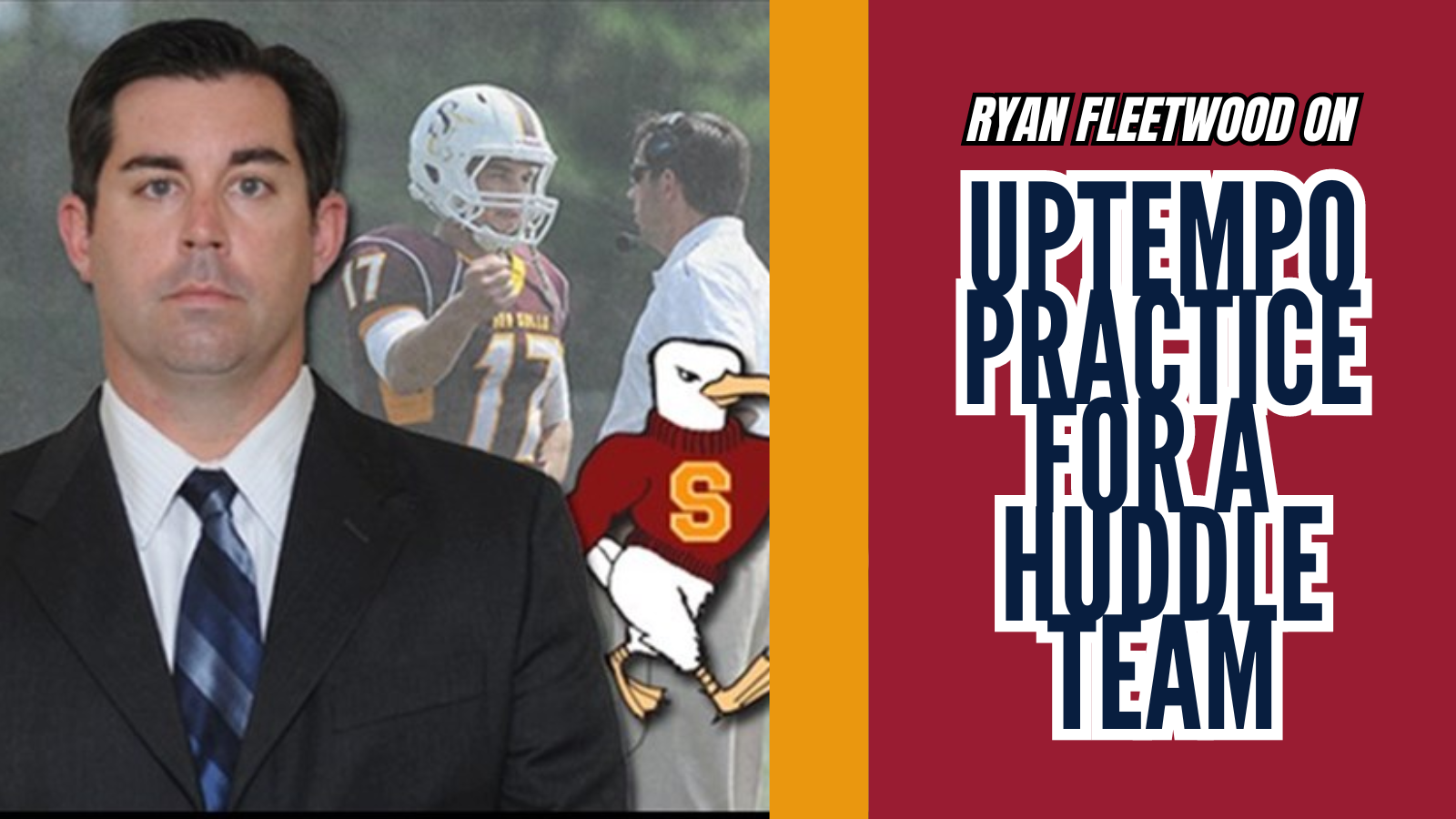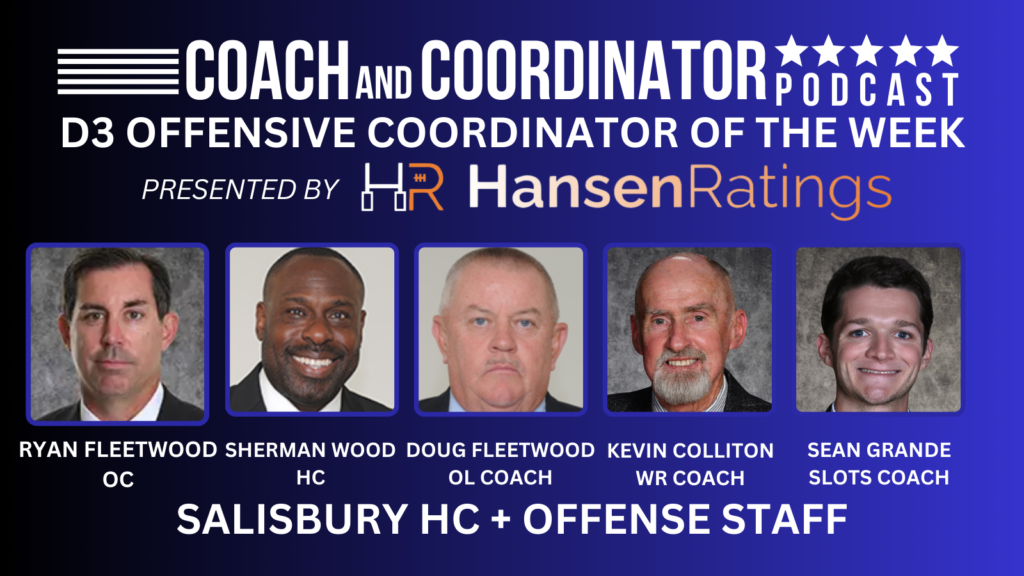
When you think of uptempo football, images of fast-paced, no-huddle offenses immediately come to mind. But Ryan Fleetwood, the offensive coordinator at Salisbury University, has found a unique approach to incorporating uptempo practices into a team that still huddles during games. His philosophy balances the best of both worlds: practicing at breakneck speed while maintaining the control and precision needed for game day huddles.
As Fleetwood explains, “You can go hard or you can go long, but you can’t do both.” This captures the heart of Salisbury’s practice strategy: focus on maximizing reps and efficiency in a short time frame. While the Seagulls may not rely on tempo during games, where they typically huddle, their practice environment is designed to create a high-paced, high-efficiency atmosphere that prepares players mentally and physically for any challenge on game day.
The Uptempo Practice Approach
Fleetwood’s Salisbury team is a great example of how teams that huddle in games can benefit from uptempo practices. Their practice sessions are structured to maximize repetition, execution, and player readiness through the following core strategies:
1. Two-Huddle System
To increase the number of reps during practice, Salisbury uses a two-huddle system. While one group is running a play, the second group is already breaking the huddle, ready to take the field immediately after the first group finishes. This approach minimizes downtime, allowing for continuous action and ensuring that players stay engaged. Fleetwood emphasizes that this method not only accelerates learning but also provides more opportunities for both starters and backups to get crucial practice reps.
Fleetwood explains, “Sometimes we may not get the perfect look from the scout team, but we get so many reps that our players are prepared for just about anything they’ll see on game day.” This relentless pace in practice helps players make quick decisions and react in real-time, which becomes invaluable during the slower-paced, huddle-heavy games.
2. Maximizing Reps, Minimizing Length
The philosophy behind Salisbury’s uptempo practices is simple: more reps in less time. Fleetwood’s team practices at a blistering pace, getting as many repetitions in as possible without extending the length of practice. They opt for shorter, more intense sessions, focusing on quality over quantity. This approach not only keeps the players fresh but also ensures that every rep counts. Fleetwood stresses that, “You can’t go hard and go long. We practice hard for a short time, and the intensity creates a game-ready environment.”
The result is a more efficient and mentally stimulating practice. The players don’t get bored, the energy remains high, and the team is conditioned to make quick adjustments in real game scenarios.
3. Practicing at Tempo, Playing at Pace
Fleetwood’s team may practice at an uptempo pace, but come game day, they are all about control. Salisbury huddles before nearly every play during games, allowing them to control the tempo and pace, frustrate defenses, and make calculated decisions. However, their uptempo practice methods ensure that they’re capable of shifting gears at any moment.
The paradox here is that uptempo practices make them more efficient at executing in a slower game-day environment. Fleetwood explains that while they huddle, the speed of practice ingrains adaptability and preparedness. “On game day, we huddle and control the tempo, but the pace of practice means we’re ready for anything,” Fleetwood says.
4. Development for All Players
One of the biggest advantages of the two-huddle system and the uptempo practice approach is the opportunity for development across the depth chart. In Fleetwood’s system, second-string and even third-string players are getting nearly as many reps as the starters. “Our second quarterback and second left guard get just as many reps as the starters, so when it’s their turn, they’re ready,” he says. This creates a “next man up” mentality where no player is left unprepared.
5. Using Wrist Coaches for Efficiency
Fleetwood adds another layer of efficiency during practices by using wrist coaches for players. In practice, instead of calling plays verbally, players use wristbands with plays on them to eliminate any wasted time. This allows for smoother transitions and helps cut out dead time that could slow the practice down. While they don’t use wrist coaches during games, this practice-time strategy ensures they get more reps in less time.
The Benefits for Teams that Huddle
Even for teams that huddle during games, adopting an uptempo practice model has clear benefits. First, it improves the team’s conditioning and mental agility. Players are used to making quick decisions and reacting to fast-paced situations, which translates to better execution during game time.
Additionally, practicing at a fast pace fosters better communication and teamwork. The two-huddle system, for example, allows for players at all levels of the depth chart to gain valuable reps and experience, which is crucial in a sport where injuries can quickly force backups into starting roles.
Conclusion
Ryan Fleetwood’s approach to uptempo practices at Salisbury University proves that speed and efficiency aren’t just for no-huddle offenses. Even teams that huddle during games can benefit from high-intensity, fast-paced practices. By emphasizing reps, conditioning, and adaptability, Fleetwood’s team is always ready for anything that comes their way on game day. The result is a unit that can control the game’s tempo, execute plays with precision, and adapt to any defensive challenge they face.
In Fleetwood’s words: “We may huddle, but our practice pace ensures we’re prepared for any tempo the game might throw at us.”
D3 Offensive Coordinator of the Week

Ryan Fleetwood, Offensive Coordinator at Salisbury University, Recognized for Outstanding Offensive Performance in 59-38 Victory Over Muhlenberg College
The Coach and Coordinator Podcast, in partnership with Hansen Ratings, is excited to name Ryan Fleetwood, offensive coordinator at Salisbury University, as the D3 Offensive Coordinator of the Week for Week 2. Fleetwood’s offense orchestrated an explosive performance, leading Salisbury to a 59-38 victory over Muhlenberg College, a team that allowed only 17.5 points per game in 2023.
Notable Stats:
- Eleven different offensive players carried or caught the ball, showcasing a balanced and versatile attack.
- The team averaged over 10 yards per rush and an impressive 35 yards per completion.
- Accumulated 648 total yards of offense on a staggering 12.0 yards per play.
- This was Salisbury’s second straight game with at least 7 touchdowns and over 600 yards of total offense.
Fleetwood’s offensive scheme overwhelmed Muhlenberg’s defense, which was one of the stingiest in the nation last year, as Salisbury continued their dominant form with another high-scoring, high-yardage performance.


